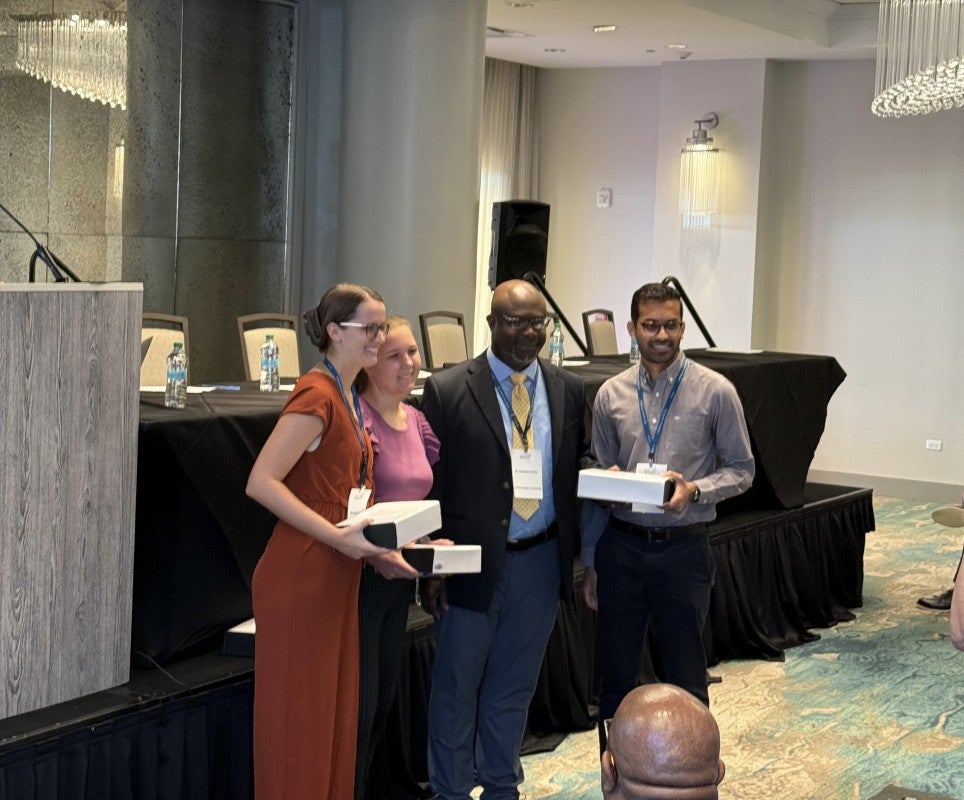Kishan Bhakta, Maranda Joyce, and Tabitha Koch were recently honored at the Southern Political Science Association (SPSA) annual meeting with the Marian Irish Award, which pays tribute to the best research paper on women and politics. The team of Rice political science PhD students focuses their research on political violence and threats of political violence, particularly those that are targeted toward women.
Prior to joining forces as scholars, each student made their way to Rice by different paths. Koch, a fourth-year graduate student, is an Illinois native who applied to multiple programs.
“Rice was one of the first programs that offered an acceptance, and so I was able to start the process of getting to know faculty earlier,” said Koch. “They seemed very interested in the close mentorship of graduate students, which solidified that Rice was the place for me.”
Third-year graduate student Joyce, who had previously worked in education and refugee policy in Texas, had a less traditional journey into the program.
“I became frustrated with politics getting in the way of policy, so I decided to explore political science graduate programs,” said Joyce. “Rice’s program stood out because there are numerous faculty members who conduct and participate in community engaged work.”
Bhakta, a fourth-year PhD student, initially planned to substitute teach after completing his undergraduate studies. His plans fell through due to the COVID-19 pandemic, however, prompting a pivot to pursue graduate school.
“I applied to multiple schools and ultimately chose Rice,” said Bhakta. “I’m from Texas, and my family is here, so being near them while also completing my studies in such a reputable program has been great.”
During their time at Rice, the three graduate students have had the opportunity to collaborate on research. Their initial project was the working paper Unacceptable or “Part of the Job?” Public (In)Tolerance for Threats Against Women Politicians.
“We were motivated by the unfortunate trend in American politics of an increase in violence and threats of violence against politicians, especially women,” said Bhakta. “Our first project explores conditions that can lead people to be more tolerant of threats against women politicians, and politicians more broadly, with the aim of explaining some of the patterns we're observing.”
In conducting the initial study, the researchers noticed that politicians who received threats of violence responded to the public in various ways, such as discussing the threats in interviews, releasing personal statements, or posting on social media. Moreover, they observed that the tone of the messaging differed, from resilient and stoic, to emotional and personal. Their observations led to their second working paper, co-authored with former Rice political science faculty member Jonathan Homola, How Should Politicians Respond to Violent Threats? A Gendered Explanation of how the Public Views Responses to Threats of Violence. The winner of this year’s Marian Irish Award, this follow-up study addresses how different types of responses impact public perceptions of a politician following the threat of violence.
“Our main takeaway was that women have a double bind,” said Joyce. “Men and women are rewarded when they give a strong response, but women do not get the same boosted rating in competency as men. At the same time, women emphasizing vulnerability are taken more seriously.”

This year’s SPSA annual meeting was held on January 8-11 in San Juan, Puerto Rico. Bhakta, Joyce, and Koch each presented some of their own research. They also noted the opportunity they had to connect with other students and academics who are engaged in related studies.
Moving forward, the team hopes to expand upon their research, possibly adding a qualitative component.
“We've thought about collecting politicians’ actual responses, whether that be responses given to the New York Times, for example, or responses disseminated through social media posts,” said Koch. “Perhaps there are gender findings that women tend to use one response type over another, or vice versa. It will be fascinating to explore another aspect of this research.”
A testament to the diverse opportunities afforded through Rice’s political science PhD program, the three students each have different aspirations, post-graduation. Koch, who has enjoyed her interactions with students as a teaching assistant, aspires to obtain a teaching-focused faculty position at a liberal arts college. Joyce aims to continue in community-engaged research, working with students at a university or in the nonprofit sector. Bhakta is exploring both academic opportunities and data-driven jobs, such as positions in startups or companies that field surveys and perform data analysis. In all avenues, the students will certainly be shaping the future, as evidenced by their novel research.
“I think a lot of the political science literature leans more theoretical, whereas our applied research focuses on issues that are occurring on the ground,” said Joyce. “We want to shed light on barriers that women still encounter, determine the best ways they can respond, and explore how to increase their participation in politics. I think all of us have a very normative interest in providing information to the public in a more applied fashion.”
The mission of the Department of Political Science, at Rice University's School of Social Sciences, is to contribute to the university and discipline through excellence in research, graduate training and undergraduate teaching. We train graduate students in modern techniques of social science research in three substantive areas of political science—American Politics, Comparative Politics, and International Relations—to prepare them for successful careers in academic research. We contribute to the liberal arts education of our undergraduate students with courses aimed at developing their skills in critical and analytical thinking and writing, increasing their understanding of political processes, and encouraging responsible and active citizenship. In addition, we train our political science majors to conduct independent political science research. We aim to prepare all of our students for successful careers in academia, government, business, law, education, non-governmental organizations, and many other professional paths.

